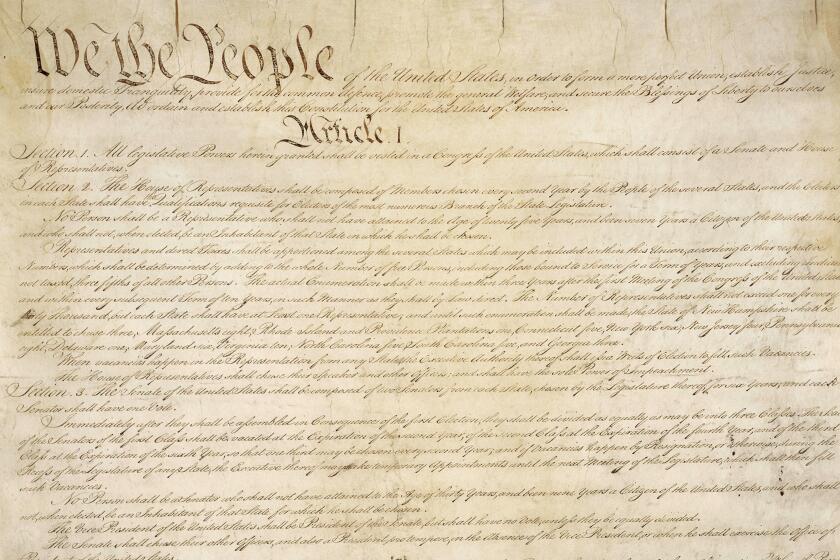Op-Ed: Why the Republicans’ new ‘Red scare’ tactics ring false

The annual Conservative Political Action Conference — a reliable index of far-right apprehensions — rolled into Washington last week, proclaiming long and loud the new Republican mantra: If we don’t reelect Donald Trump, neo-Stalinism will befall us!
Speaker after speaker told the assembled faithful what President Trump had intimated in his State of the Union address: Republicans in 2020 plan to run against Democrats as though they were Stalin or (the pre-Trump) Kim Jong Un. White House economist Larry Kudlow urged Republicans to “put socialism on trial.” And Republican National Committee Chairwoman Ronna McDaniel advocated an education campaign: “We can’t think that the American people understand what socialism is. We have to go out and educate people. We need to talk about Venezuela.”
Wherein lies the Republicans’ problem: The Soviet Union, and its brand of communism — which virtually all Americans had both heard of and disliked — is long gone (replaced, in Russia, by kleptocratic authoritarianism and in China by Leninist capitalism). Moreover, American business (Wall Street in particular) has been soft on China for the last 30 years, and just last week, President Trump even recommended to his North Korean BFF that he’d do well to model his country on Vietnam, which is still under strict Communist control.
The public’s idea of socialism has shifted over the last 70 years from one verging on totalitarianism to one far closer to European social democracy.
It’s not surprising that the GOP would rely on a playbook that has worked well for them in the past, especially when they don’t need to sway a majority of Americans — only a large enough group to swing a couple of key states. But it’s a far riskier strategy now than it was in the past.
Not surprisingly, Americans’ definitions of socialism have changed since the Cold War ended. In September of 2018, Gallup asked Americans for their “understanding of the term ‘socialism.’” One-third — 33% — answered that it meant a society with equal standing for everybody, in which benefits and services were free for all. When Gallup had asked Americans the same question in September of 1949, at the height of the Cold War, just 14% gave that answer, while 34% answered that it meant government ownership of all business and control of society. Half that total — 17% — gave that answer in 2018. (Other answers drew far less support.)
That is, the public’s idea of socialism has shifted over the last 70 years from one verging on totalitarianism to one far closer to European social democracy. The disappearance of Soviet communism has clearly contributed to that shift, but so has the transition over that same 70 years to a more aggressive capitalism that has rewarded chiefly the rich.
That helps explain why a record number of Americans, and a majority of Democrats, now think of socialism positively, and clearly distinguish democratic socialism from its communist deviation. A 2017 YouGov poll of millennials found that 44% of them said they’d prefer to live in a socialist nation, while 42% preferred one that was capitalist, and 7% one that was communist (alas).
When Sen. Bernie Sanders (I-Vt.) delivered a speech at Georgetown University in the fall of 2015, which he’d billed as providing his own definition of socialism, he cited as his precedents Franklin Roosevelt’s creation of Social Security, Lyndon Johnson’s creation of Medicare, and Martin Luther King’s commitment to an egalitarian society. His vision of socialism, he emphasized, was light-years distant from a society in which all private enterprise, particularly small- and medium-sized businesses, were taken over by the state.
For their part, Republicans desperately hope that they can substitute Venezuela for the Soviet Union. Their problem is that Sanders, Rep. Alexandria Ocasio-Cortez (D-N.Y.) and the vast majority of actually existing American socialists look to Sweden, Norway and Denmark, not Venezuela, as their model. As well they should: The Scandinavian social democracies rank highest on indices of social mobility, general wellness and just plain happiness.
Enter the Fray: First takes on the news of the minute »
Moreover, while the battered husk of the U.S. Communist Party provided McCarthy-era Republicans with a domestic target, meager in size and power though it was, there’s no equivalent organization hiding under Americans’ beds today.
That won’t deter Republicans, of course. They’ve labeled every Democrat since Al Smith and Franklin Roosevelt as socialists, and every reform from the minimum wage to national parks as socialistic. The absence of Soviet communism and their own century of crying wolf should make instigating a new “Red scare” more difficult than it’s been in the past, though the emergence of actual democratic socialists will doubtless spur the Republicans on.
Accuracy will not impede them. Indeed, Trump’s Council of Economic Advisers released a report last year attacking the socialism of Sanders and AOC by equating it with the most murderous policies of Stalin and Mao. All the more reason for Bernie and AOC to continue to be clear about what they’re for, and what they’re against.
Harold Meyerson is executive editor of American Prospect and a contributing writer to Opinion.
More to Read
A cure for the common opinion
Get thought-provoking perspectives with our weekly newsletter.
You may occasionally receive promotional content from the Los Angeles Times.






